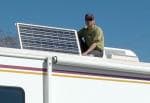
Michael Hippenhammer installing a solar panel on a RV
|
Please join me in welcoming Michael Hippenhammer, PV Sales & Design for E2 Powered, as our first expert writer to contribute to Truck Camper Magazine. Michael has been installing RV solar systems for six years and estimates that each panel that he installs will save between 100 and 1,000 gallons of fuel in its lifetime.
For his first article with TCM, he introduces the subject of solar systems for truck campers and makes a few suggestions for beginners. In the future, Michael will get more in depth about solar panel installation, usage, and potential.
Out Of This World Solar – by Michael Hippenhammer
Over the years, truck campers have added more and more electric amenities including microwaves, entertainment systems, satellite receivers, and even multiple electric slide outs. Naturally it takes a lot of energy to run these systems.
Unfortunately, many truck camper manufactures still design their battery systems as if it were the 1970s when all we had were lights, a fan, and a water pump. To this day, I see many truck campers with just a single 12-volt RV/marine battery.
For some, a single RV marine battery will be fine. But for myself and others who like to get away from the people, noise, and congestion of everyday life, we need more power.
There are two answers to this need; generators and solar systems.
The big down side to generators is that your neighbors and any nearby wild life will be hating you for disturbing their peace. Other down sides include needing to regularly refill with propane, and performing regular maintenance like oil and filter changes. And they’re expensive often adding thousands to the price of a new truck camper.
Or, you can invest in a solar system and enjoy the outdoors peacefully, quietly, reliably, and pollution free.
The trick is to choose the right size solar panel system for your needs. The main goal is to cover what you use on a daily basis.
If you use the basics like lights, fans, water pump, and a little radio, you should be fine with a single 50 to 80-watt solar panel. A 125-watt system is good for all of the basics listed above and the added use of your central heating fan. With two 125-watt panels, you can add the microwave, a coffee maker, and even a hair dryer.
The better charge controllers use Pulse Width Modulation, or PWM technology. If the charge controller that you’re looking at does not offer PWM, don’t buy it. The older technology wastes almost 50% of the incoming solar energy.
Maximum Point Power Tracking, or MPPT, is the best and a recommended upgrade from the PWM technology. You can extract about 30% more energy than with PWM technology, but the MPPT charge controllers are more expensive.
The real secrets to a quality solar system are the batteries. Choosing the right batteries can make all the difference. The goal is to get the most storage capacity as possible for the space available.
12-volt RV/marine batteries give 30% of their rated storage capacity. For example, a group 24 115ah battery will only give 34.5ah of true capacity or 30%. They are designed to be part starting-battery and part storage-battery. Their led plates are thinner to be able to dump higher amperages for starting boat motors.
A pair of 6-volt golf cart batteries, wired in series to give you 12-volts, is rated at 225ah with 60% available of their rated storage capacity or 135ah. These batteries are made for storage capacity and slower discharge. Their led plates look like corrugated cardboard.
Absorption Glass Mat 6-volt golf cart batteries, or AGM batteries, are twice the price but give you maintenance free convenience. Golf cart batteries should give you about six years of service and I have replaced some that were still working after eight years.
It’s important to maintain your batteries by keeping them topped off with distilled water. Exposing the led plates to air will dramatically shorten their life. The exception to that rule is the AGM batteries, which don’t require watering. It’s also important to keep the voltage above 12.1-volts. Going below this voltage will also shorten the life of your batteries.
Prices start from $600 for an 80-watt solar system and $1000 for a 125-watt system. Of course for just under $5,000 you can get two 125-watt panels, tilt mounts, 2000 watt inverter and charger, and four golf cart batteries all installed.
Once you live with a solar system on your truck camper, you will never want to give it up.
